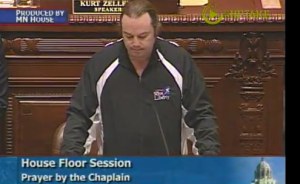 Minnesota State Representative Mary Franson (R- Alexandria) – she who compares providing Food Stamps to low income children with feeding wild animals – is once again speaking out. But this time, I agree with her, kinda sorta.
Minnesota State Representative Mary Franson (R- Alexandria) – she who compares providing Food Stamps to low income children with feeding wild animals – is once again speaking out. But this time, I agree with her, kinda sorta.
Franson and I both find prayers in the House chamber to be offensive. The agreement ends there.
Franson has long felt that Earth Day is a Pagan holiday, which offends her Christian faith. Therefore, she was not thrilled to hear Minnesota House Chaplain Grady St. Dennis mentioning Earth Day and the BP oil spill in the prayer that recently opened House proceedings. As the Star Tribune reported, Representative Franson Tweeteth that St. Dennis’s prayer:
“may as well been dedicated to “Mother Earth”, coincidence? I think not. 2nd offensive prayer in a month.”
The prayer Franson finds offensive, I find inspired. And I can guarantee we’re never going to convince each other.
Such disagreement is the rule, not the exception. Minnesotans don’t agree on who God is, what He wants us to do, and what He thinks about the issues. It’s not just that Christians, non-Christians, doubters and non-believers don’t agree. Christians and Christians don’t agree. People sitting in the same aisle of the same church don’t even agree.
And resolving this disagreement about God is not what the Minnesota House does. It’s not their job.
So why have an official daily House prayer? Why bring any kind of religion into the chamber — Mary Franson’s brand of Christianity, John Marty’s brand of Christianity, Keith Ellison’s Islam, Frank Hornstein’s Judaism, Pete Stark’s Atheism or anyone else’s spiritual viewpoint?
Just leave it out. Let people say a silent prayer to themselves, if they so choose. But keep all officially sponsored, publicly expressed religious pronouncements out of the legislative chambers.
I presume that official government-sponsored and -organized prayer in the legislative chambers must have been determined to be legally permissible. But that doesn’t make it advisable. Heaven knows, the Legislature has enough difficult issues to resolve without adding unresolvable theological questions to their “to do” list.
This is the only way I can guarantee that Mary Franson and I won’t be offended again by what we hear in the daily House of Representatives prayer. If she and her colleagues aren’t willing to separate the work of religious institutions from the work of our democracy, I guarantee both of us will be offended on a regular basis.
– Loveland
























